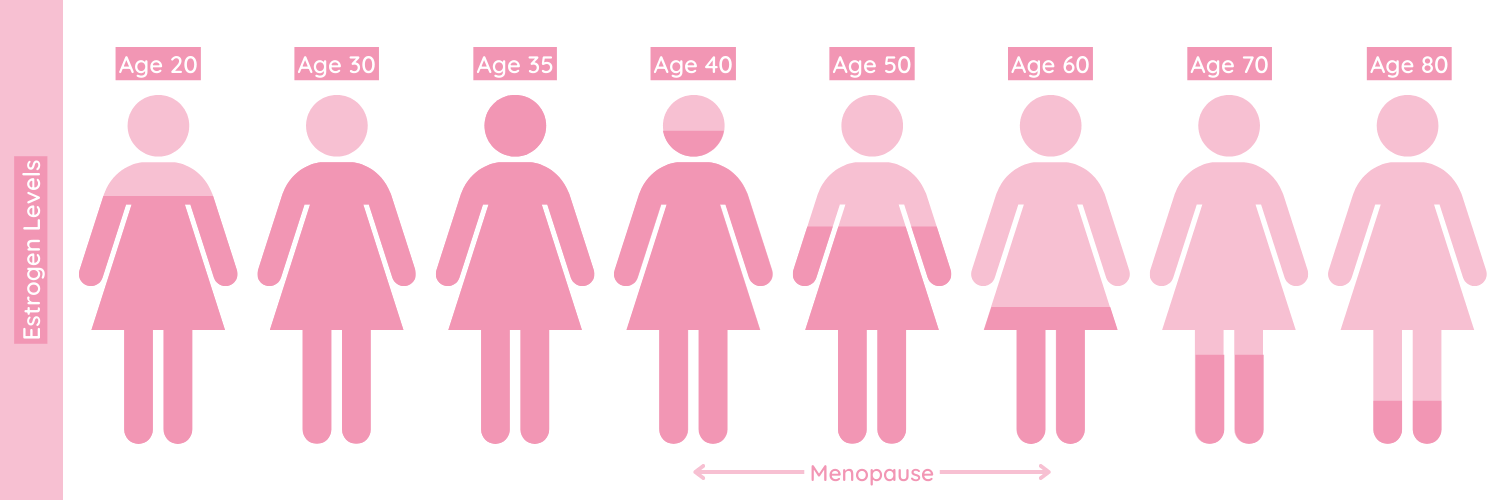Does HRT Cause Weight Gain?
Table of Contents
Hormone Replacement Therapy (HRT) is a treatment for managing menopausal symptoms, but many women wonder if it leads to weight gain. This concern can impact their decision to start or continue HRT. In this blog, we’ll explore the relationship between HRT and weight gain, discuss the factors involved, and provide tips for managing weight during this transition.
What is HRT?
Hormone Replacement Therapy (HRT) is a medication designed to relieve symptoms associated with hormonal imbalances during menopause. As estrogen and progesterone levels decline, many women experience symptoms such as hot flashes, mood swings, and vaginal dryness. HRT aims to restore these hormone levels, relieve discomfort and improve overall quality of life.
There are different types of HRT, including estrogen-only therapy for women who have had a hysterectomy and combined therapy that includes both estrogen and progesterone for those with an intact uterus. HRT can be administered in various forms, including oral tablets, patches, gels, and vaginal tablets, allowing for tailored approaches based on individual needs.
While HRT can offer significant benefits, including symptom relief and protection against bone loss, potential risks, such as increased chances of blood clots and certain cancers, must be considered. Therefore, the decision to start HRT should be made in consultation with The Family Chemist, considering personal medical history and preferences.
So, does HRT cause weight gain?
The relationship between Hormone Replacement Therapy (HRT) and weight gain is complex. While many women express concerns about gaining weight when starting HRT, research does not strongly support the idea that HRT directly causes significant weight gain.
Some women may experience temporary water retention during the initial months of HRT, which can slightly increase the scale. However, this is generally short-lived and not indicative of actual weight gain.
Understanding the various factors, including hormonal fluctuations, ageing, and lifestyle habits, that often influence weight changes during menopause can empower you to take control of your health. The decline in metabolism and changes in body fat distribution during menopause can contribute to weight gain, irrespective of HRT, but this knowledge can help you make informed decisions about your health.
Some studies suggest that specific HRT regimens help manage weight and improve body fat distribution. By restoring hormonal balance, HRT can positively impact metabolism and appetite, making it easier for some women to maintain or lose weight.

What is the cause of my weight gain on HRT?
If you’ve noticed weight gain after starting Hormone Replacement Therapy (HRT), several factors may be at play:
Water retention
One of the most common reasons for weight gain when beginning HRT is temporary water retention. Some women experience this in the initial months, which can lead to a slight increase in weight. Fortunately, this is usually short-term and subsides as their bodies adjust to the treatment.
Hormonal changes
HRT aims to restore hormonal balance, but it can also lead to shifts in fat distribution. Many women find that body fat becomes redistributed, often increasing around the abdomen, affecting overall weight perception.
Decreased metabolic rate
As women age and enter menopause, their resting metabolic rate naturally declines. This means their bodies may burn fewer calories, making weight gain more likely, especially if their dietary habits remain unchanged.
Lifestyle factors
Weight gain may also be influenced by lifestyle changes that accompany menopause. Factors such as decreased physical activity, changes in dietary habits, or increased stress levels can all contribute to weight gain during this time.
Age-related changes
Ageing itself can lead to changes in body composition, including a decrease in muscle mass. Since muscle burns more calories than fat, a decrease in muscle can slow metabolism and contribute to weight gain.
Individual responses to HRT
Each woman’s body reacts differently to HRT. While some may experience weight gain, others may not. This individualised response underscores the importance of monitoring your body and discussing significant changes with your healthcare provider, ensuring that your HRT regimen is tailored to your needs.
How can HRT help women lose weight?
It’s important to remember that Hormone Replacement Therapy (HRT) can support weight management for some women during menopause.
Here are several ways HRT may help facilitate weight loss or prevent weight gain, offering hope and optimism for your health journey.
Restoring hormonal balance
HRT can help regulate metabolism by replenishing estrogen and progesterone levels. Balanced hormones can improve the body’s ability to use and utilise calories and may reduce cravings and appetite.
Reducing hot flashes and night sweats
HRT effectively alleviates menopausal symptoms like hot flashes and night sweats, which can disrupt sleep and lead to weight gain. Better sleep quality can enhance energy levels and motivation for physical activity.
Improving mood and reducing stress
Hormonal fluctuations can contribute to mood swings, anxiety, and depression. HRT can help stabilise mood, potentially reducing emotional eating and allowing women to focus more on healthy lifestyle choices.
Fat redistribution
Some studies suggest that HRT may promote a shift in fat distribution from the abdominal area to more peripheral regions, such as the hips and thighs. This change can improve body composition and overall health.
Increased energy levels
By alleviating menopausal symptoms and restoring hormonal balance, HRT can enhance energy levels. Higher energy can lead to increased physical activity, supporting weight loss efforts.
Supporting muscle mass
Maintaining muscle mass is crucial for a healthy metabolism. HRT may help mitigate muscle loss associated with ageing, thereby supporting a higher metabolic rate and aiding in weight management.
Encouraging healthy habits
Women who experience symptom relief through HRT may feel more motivated to exercise regularly and maintain a balanced diet, further supporting their weight management goals.
Does being on HRT make it harder to lose weight?
The impact of Hormone Replacement Therapy (HRT) on weight loss can vary from person to person. While some women may find it challenging, HRT itself is not inherently responsible for making weight loss more difficult. Here are several considerations:
Individual responses
Each woman’s body reacts differently to HRT. While some may experience weight gain or difficulty losing weight, others may find that HRT supports their weight management efforts by alleviating menopausal symptoms and restoring hormonal balance.
Hormonal fluctuations
During the early stages of HRT, some women may experience water retention, temporarily affecting weight. This is often mistaken for fat gain but typically resolves over time.
Metabolic changes
HRT can influence metabolism, but the overall effect may depend on the type of HRT used and individual hormonal responses. Some women may experience a slight improvement in metabolic function, while others may not notice significant changes.
Lifestyle factors
Weight loss is heavily influenced by lifestyle choices, including diet and physical activity if a woman does not adjust her eating habits or exercise routine while on HRT, she may find it more challenging to lose weight.
Ageing and muscle loss
Women naturally lose muscle mass as they age, which can slow metabolism. HRT may help mitigate some muscle loss, but maintaining an active lifestyle with strength training is crucial for effective weight management.
Psychological effects
HRT can improve mood and energy levels, which may positively affect motivation for physical activity. However, if a woman feels that HRT is not producing the desired results, it may lead to frustration and decreased motivation.
How can I help combat menopausal weight gain?
Managing weight during menopause can be challenging, but there are effective strategies that can help. Here are some tips to combat menopausal weight gain:
Maintain a balanced diet
- Focus on nutrient-dense foods: Incorporate plenty of fruits, vegetables, whole grains, lean proteins, and healthy fats into your diet. These foods provide essential nutrients while helping to keep you full.
- Watch portion sizes: Being mindful of portion sizes can help prevent overeating. Consider using smaller plates or bowls to help manage serving sizes.
Stay hydrated
- Drink plenty of water throughout the day. Staying hydrated can help control appetite and support overall health. Sometimes, thirst is mistaken for hunger.
Engage in regular physical activity
- Combine cardio and strength training: Aim for at least 150 minutes of moderate aerobic activity each week and strength training exercises at least twice a week. This combination helps burn calories and build muscle, essential for boosting metabolism.
- Incorporate movement into your day: Look for opportunities to be active throughout the day, such as taking the stairs, going for walks, or participating in activities you enjoy.
Manage stress
- High-stress levels can lead to emotional eating and weight gain. To manage stress effectively, implement stress-reducing techniques like mindfulness, meditation, yoga, or deep breathing exercises.
Prioritise seep
- Aim for 7-9 hours of quality sleep each night. Poor sleep can disrupt hormonal balance and metabolism, making weight management more challenging.
Consider professional guidance
- Consider consulting a registered dietitian or our pharmacist if weight gain becomes a significant concern. They can help develop a personalised nutrition and exercise plan tailored to your needs.
Stay consistent and patient
- Weight management during menopause may take time and effort. Focus on gradual changes and be patient with yourself. Celebrate small victories along the way to stay motivated.
How to start your weight loss journey
Mounjaro (tirzepatide) and Wegovy (semaglutide) are injectable medications approved for weight management in adults with obesity or overweight conditions. Both medications work by mimicking hormones that regulate appetite and food intake. Here are effective strategies to enhance weight loss while using these treatments:
Follow the prescribed dosage and schedule
- Adhere strictly to the dosage and administration schedule recommended by our pharmacist. Consistency is critical to achieving optimal results.
Maintain a balanced diet
- Focus on a nutritious, calorie-controlled diet that emphasises whole foods. Incorporate plenty of fruits, vegetables, lean proteins, and whole grains while minimising processed foods and sugary snacks.
Practice portion control
- Being mindful of portion sizes can help prevent overeating. Use smaller plates and bowls to help regulate portions, and listen to your body’s hunger cues.
Engage in regular physical activity
- Incorporate both aerobic and strength-training exercises into your routine. Aim for at least 150 minutes of moderate-intensity exercise per week. Regular physical activity can enhance the effectiveness of Mounjaro or Wegovy and support overall health.
Stay hydrated
- Drinking plenty of water is essential for weight loss. It can help manage hunger and improve metabolic processes. Aim for at least 8-10 cups of water daily.
Monitor your progress
- Keep track of your food intake, physical activity, and weight changes. Journaling can help you stay accountable and identify patterns that may impact your weight loss journey.
Manage stress and emotional eating
- Stress can trigger emotional eating, which can hinder weight loss efforts. Practice stress-reduction techniques, such as mindfulness, meditation, or yoga, to help manage cravings.
Set realistic goals
- Establish achievable weight loss goals, aiming for gradual and sustainable changes. Aiming to lose 1-2 pounds per week is a realistic target for many individuals.
Work with our pharmacist
- Regular follow-ups with our pharmacist are essential. They can help monitor your progress, address any side effects, and adjust your treatment plan.
Consider behavioral support
- Participating in weight loss programs or support groups can provide motivation and accountability. Behavioural therapy can also help develop healthy habits and coping strategies.



